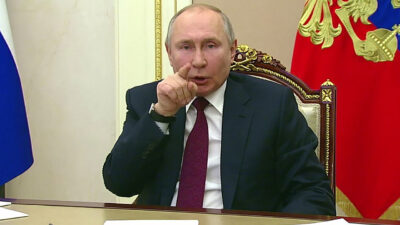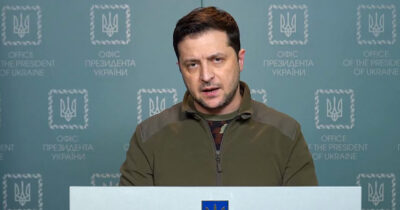In one respect the war in Ukraine has broken into binaries, the most prominent being Putin and Zelensky.
 For whatever reasons he has – a dream of being the Russian who restored his country to its former Soviet power and geographic immensity, the old KGB man who wants to hit back at the West’s arrogance and hypocrisy, the paranoid who believes he must strike his enemies, whomever he imagines them to be, before they strike him – he has sent his army into Ukraine, and short of pulverizing every city and creating a permanent occupation force in a country the size of Texas with 44 million ferocious resisters, he is stuck. To go forward will increase his insecurity as body bags flow home and the economy crashes. To go backwards and pull his forces out means he loses ‘face’, that awful casus belli for more and more bloodshed. In losing face, he accepts humiliation, and for one who seems to take enormous pride in a shirt-off-riding-a big-horse-judo-man definition of masculinity, that is a perception of weakness he cannot afford. He is surrounded by predators he helped raise. He will be terrified that they will see the limp, the slowing down, the slackening of reflexes, the fear. Behind all his machismo and threats, there must be a fear he can never escape – who can I trust? For how long? What are the signs of betrayal? Since Covid, he has apparently isolated himself to the point of spending most of his time with his bodyguards. Does he look at them closely, all the time, wondering which one could come for him when he’s asleep?
For whatever reasons he has – a dream of being the Russian who restored his country to its former Soviet power and geographic immensity, the old KGB man who wants to hit back at the West’s arrogance and hypocrisy, the paranoid who believes he must strike his enemies, whomever he imagines them to be, before they strike him – he has sent his army into Ukraine, and short of pulverizing every city and creating a permanent occupation force in a country the size of Texas with 44 million ferocious resisters, he is stuck. To go forward will increase his insecurity as body bags flow home and the economy crashes. To go backwards and pull his forces out means he loses ‘face’, that awful casus belli for more and more bloodshed. In losing face, he accepts humiliation, and for one who seems to take enormous pride in a shirt-off-riding-a big-horse-judo-man definition of masculinity, that is a perception of weakness he cannot afford. He is surrounded by predators he helped raise. He will be terrified that they will see the limp, the slowing down, the slackening of reflexes, the fear. Behind all his machismo and threats, there must be a fear he can never escape – who can I trust? For how long? What are the signs of betrayal? Since Covid, he has apparently isolated himself to the point of spending most of his time with his bodyguards. Does he look at them closely, all the time, wondering which one could come for him when he’s asleep?
There are decades of evidence of his capacity for mass murder and individual murder – see Grozny and Aleppo and the assassinations of his opponents. He has stolen billions from Russia. This also is well known.
He understands that he can never retire to a dacha or be taken into custody for trial. His fear also makes him a very scary man. Perhaps he might think, “I’m going down. I’ll take the world with me.” It’s happened before. When Hitler in his Berlin bunker knew the end was near, he said, “If the war is lost, the people will be lost also. It is not necessary to worry about what the German people will need for elemental survival. On the contrary, it is best for us to destroy even these things. For the nation has proved to be the weaker, and the future belongs solely to the stronger eastern nations. In any case, only those who are inferior will remain after this struggle, for the good have already been killed.” *
Maybe Putin feels that, at 69, his time is running out, his vitality draining away, the unease of his lackeys growing more pronounced. Hannah Arendt wrote that “it is illegitimate or waning power that turns most readily to violence.” Perhaps Putin, like some monster from a Russian fairy tale, thinks, “Let me kill so that I may feel alive.”
 President Zelensky appeared on the Ukrainian edition of Dancing With The Stars in 2006.
President Zelensky appeared on the Ukrainian edition of Dancing With The Stars in 2006.
He made his living as a comedian. He became the real President of Ukraine in 2019.
Most comedians, by the nature of their profession, make fun of themselves. When this crisis began, few if any expected Zelensky to become the voice and face of Ukrainian resistance and of the Ukrainian people.
He does not posture. He does not engage in performative scenes of machismo. He speaks directly and simply. On a US offer to escape: “The fight is here; I need ammunition, not a ride.”
On the defense of Ukraine: “I am here. We are not putting down arms. We will be defending our country, because our weapon is truth, and our truth is that this is our land, our country, our children, and we will defend all of this.”
Here in a lengthy quote, Robin Givhan captures the essence of Zelensky’s appeal:
“[He] has shaped a visual narrative about the power of vulnerability, the persuasiveness of simplicity and the public’s collective need to believe that modest men can rise to meet any moment.”
“When Zelensky addresses his countrymen and the world, his words are straightforward. He’s noticeably plain-spoken. It’s the rhythm of his remarks that’s striking. His rhetoric doesn’t soar, but his sentences have the beats of poetry.”
“We know for sure that we don’t need the war,” Zelensky said. “Not a Cold War, not a hot war, not a hybrid one.” He shifts on his feet. He sniffles. These are grace notes of imperfection.”
“In an ever-expanding series of video missives and addresses in Ukrainian, Zelensky speaks in triptychs, in trios of short, declarative sentences or invigorating fragments. He pounds on a single word to make his point. His phrasing keeps time like a snare drum. Over the days, the tie vanishes. The suit is stripped away. The glow of a rested, well-fed man dulls. The personal trappings of hierarchical authority have been cast aside.”
“In a post to social media on the day the borders were breached, and explosions erupted in Ukrainian cities, Zelensky asked Ukrainians to remain calm. He’s tieless. He’s still in his suit; his white shirt is tidy. But he no longer looks neatly, cleanly shaven. His stance is far more informal as he looks down into the camera. He promises his countrymen that the government has not lost its footing. The government is functioning. On the citizens’ behalf, the system was working. We are working; the army is working. The entire security and defense sector of Ukraine is working.”
In one of his recent columns in the Times, Thomas Friedman referenced “the fear barrier,” the psychological impediment that prevents individuals or a populace from opposing a force that has the power to harm them. Zelensky has broken through that barrier. This is not to suggest that he is not afraid, only that he will not let his fear paralyze him or stop him from the performance of his duties. With the exception of Martin Luther King, I do not know of another public figure in my lifetime who better personifies eloquence and physical bravery in the presence of an existential threat.
Zelensky is the antithesis of Putin. Putin is the hollow man with a weapon and a snarl, the killer. Zelensky is the ordinary man who acted the fool to earn his living, and who as President has become the most vivid 21st century face of integrity and courage.
Zelensky is in mortal danger. Putin wants to kill him. But each day Zelensky remains alive and offering messages of hope and defiance, he becomes something more than the short, unshaven fellow in army drab. He is the man who speaks of love – of his people, of his country and of life itself.
*From Albert Speer’s memoir Inside The Third Reich